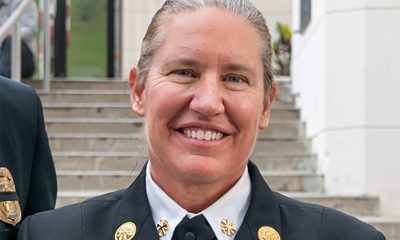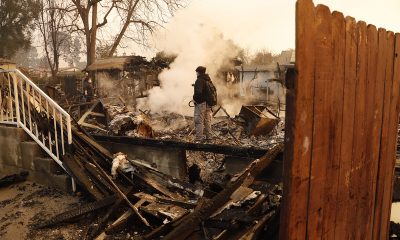Local
Future of STD testing and treatment by the Los Angeles LGBT Center uncertain
STD epidemic rages in Los Angeles County
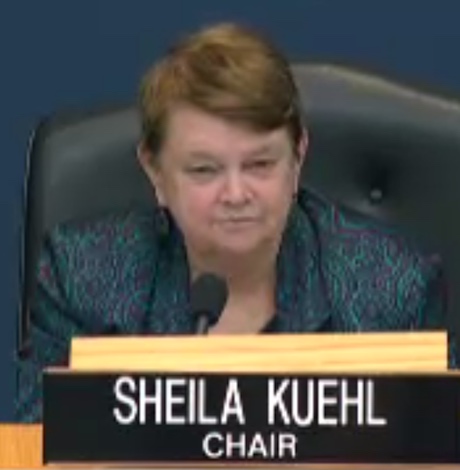
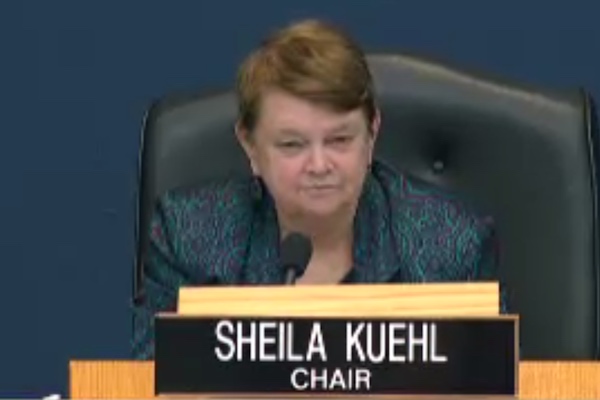
Board Supervisor Sheila Kuehl on Nov. 20 (screen grab from BOS live stream)
The Los Angeles County Board of Supervisors unanimously passed a motion on Nov. 20 to approve the allocation of emergency reserve funds for organizations, including the Los Angeles LGBT Center, for public health initiatives like STD testing and treatment.
The motion, introduced by Supervisors Sheila Kuehl and Mark Ridley-Thomas, will add $5 million for public health programs, along with $1 million in grant funding for clients with substance abuse disorders, over a period of two years. Pending the Health Department’s decisions concerning the allocation of those funds, the Center might be able to maintain levels of service for programs that were threatened, according to reports, by the organization’s dispute with Los Angeles County over funding for existing contracts.
In the last fiscal year, STD programming cost the Center $1.5 million, which was covered by reserve funds and other sources including contracts with LA County—which has supplied a consistent, flat level of funding to the organization, including in this case. High demand for testing and treatment, however, has depleted available money from contracts with the County.
Requests for funding increases from the County were turned down, to the surprise of the Center’s Chief of Staff, Darrel Cummings. He told the Los Angeles Bladethe organization was forced to draw funds from other programs—like meal services for seniors and housing services for youth experiencing homelessness—to cover the costs: “Every service we provide is impacted by our having to redirect funds from one place to another.”
The Board’s motion for emergency funding was introduced just as the Center was prepared to announce cuts in free STD testing and treatment, following the discovery of an internal email from the Center’s Chief of Staff, Darrel Cummings, which was printed in WEHOville.
LA County Supervisor Sheila Kuehl, author of the Board motion, told the Los Angeles Blade: “Local, state and federal governments have not been adequately investing in STD prevention. Funding has not kept up with the need and rising costs. Today the County voted to utilize our reserves to help The LGBT Center and other important community providers prevent STD infection, and we will do everything we can to find ways to invest even more money in preventing STD infection. We will continue to work with our local providers to advocate ever more effectively.”
Budgetary constraints have tightened amid a spike in STD rates nationwide, which has hit LA County especially hard. New gonorrhea cases nearly doubled from 2016 to 2017 among men who have sex with men (MSM), according to nationwide statistics from the Centers for Disease Control and Prevention (CDC).
Officials shared the latest data documenting the number of diagnoses in the County between Jan. and August 2018. They found 5,337 cases of syphilis, 30 cases of congenital syphilis, and 16,654 cases of gonorrhea.
If the emergency motion was not introduced by the LA County Board of Supervisors and the Center was forced to comply with funding limits set by existing contracts, Cummings explained that the organization would have to cut STD testing/treatment services by 50 percent.
“Epidemiologists here calculate, in a very conservative fashion, what that would look like in one year,” Cummings said. “It would mean 8,000 people with undiagnosed gonorrhea. That would obviously be contributing to what is already a crisis.”
Cummings said public health officials must redouble efforts to fund testing and treatment programs—including those performed by the Center—but instead feels the County voiced appreciation for the organization’s programs while ignoring their efficacy.
“We’re diagnosing 22 percent of all syphilis cases in Los Angeles County,” Cummings said. “And the County has 14 of their own facilities—none of which are targeting the LGBT community. And [the County] doesn’t have to hold bake sales to keep their operations open. They’re fully funded no matter how effective or not they are.”
The Center’s cultural competency respective to the LGBT community is in large part responsible for the rise in the number of patients whom the organization is testing and treating for STDs. LGBT Californians are disproportionately affected by the STD crisis while the number of diagnosed cases in the state has reached record highs for the third consecutive year. Michael Fraser, Ph.D., executive director of the Association of State and Territorial Health Officials (ASTHO), explained that local and community-based providers are often better trained to meet the needs of at-risk populations. For example, “The techniques you might use in the MSM community are really different from what you might use with pregnant women,” he explained.
The need to address public health challenges among underserved communities was addressed in the Board of Supervisors’ vote—which moved to, among other tasks, “Instruct the Director of the Department of Public Health to develop and release a solicitation within 45 days to support the delivery of STD screening and treatment services specifically targeting underserved geographic areas and sub-populations of the County.”
Cummings emphasized that the Center has historically worked well with the County on public health issues. “Even though I’ve been pretty angry with the County because of their lethargic response to this issue,” Cummings told the LA Blade, “that exists in the context of—generally speaking, over decades—having very good relationships with public health officials in Los Angeles and elected officials who care a great deal about these matters.”
California
South Park provides green space to a predominantly Latino community
‘…the need for green spaces within Latino communities has never been greater, especially in South L.A.

South Park, one of the oldest parks in Historic South Central, has brought multi-generational Angelenos together for centuries.
The park sits at the intersection of 51st Street and Avalon Blvd, surrounded by some of the most socially, culturally and historically important locations in the country, including Central Avenue, site of the West Coast jazz scene in in the 30s and 40s, the former Black Panther Party headquarters in L.A and one of the epicenters of the Watts rebellion in 1965.
The park—also known as Barry White Park—was founded in 1899. Today, 126 years later, the park still stands—hosting weekend soccer games, señoras chismeando, recreational activities like swimming, card games among elders and city-led events.
The park was named after two-time Grammy Award winner and R&B singer Barry White, who grew up in South Central, just blocks away from the park.
As PBS initially reported, the City of Los Angeles purchased it from a private developer for $10,000. At that time it was not as big as it is now, but was always characterized by its tall palm trees.
The park is located in Los Angeles City Council District 9, where the population is predominantly Latino (79.9%). According to Park Equity, Life Expectancy and Power Building research, the need for green spaces within Latino communities has never been greater, especially in South L.A, where the landscape is often characterized by an overconcentration of liquor stores and a lack of quality and accessible recreational spaces. More than a century after the park’s opening, for many local residents, it is one of the only parks within walking distance for them.
Amanda Walker, 56, moved to L.A. from Chicago, Illinois. She said one of her favorite things to do at the park is to take in the sun.
“The sun falls perfectly anywhere through the park, that’s probably my favorite part,” Walker said.
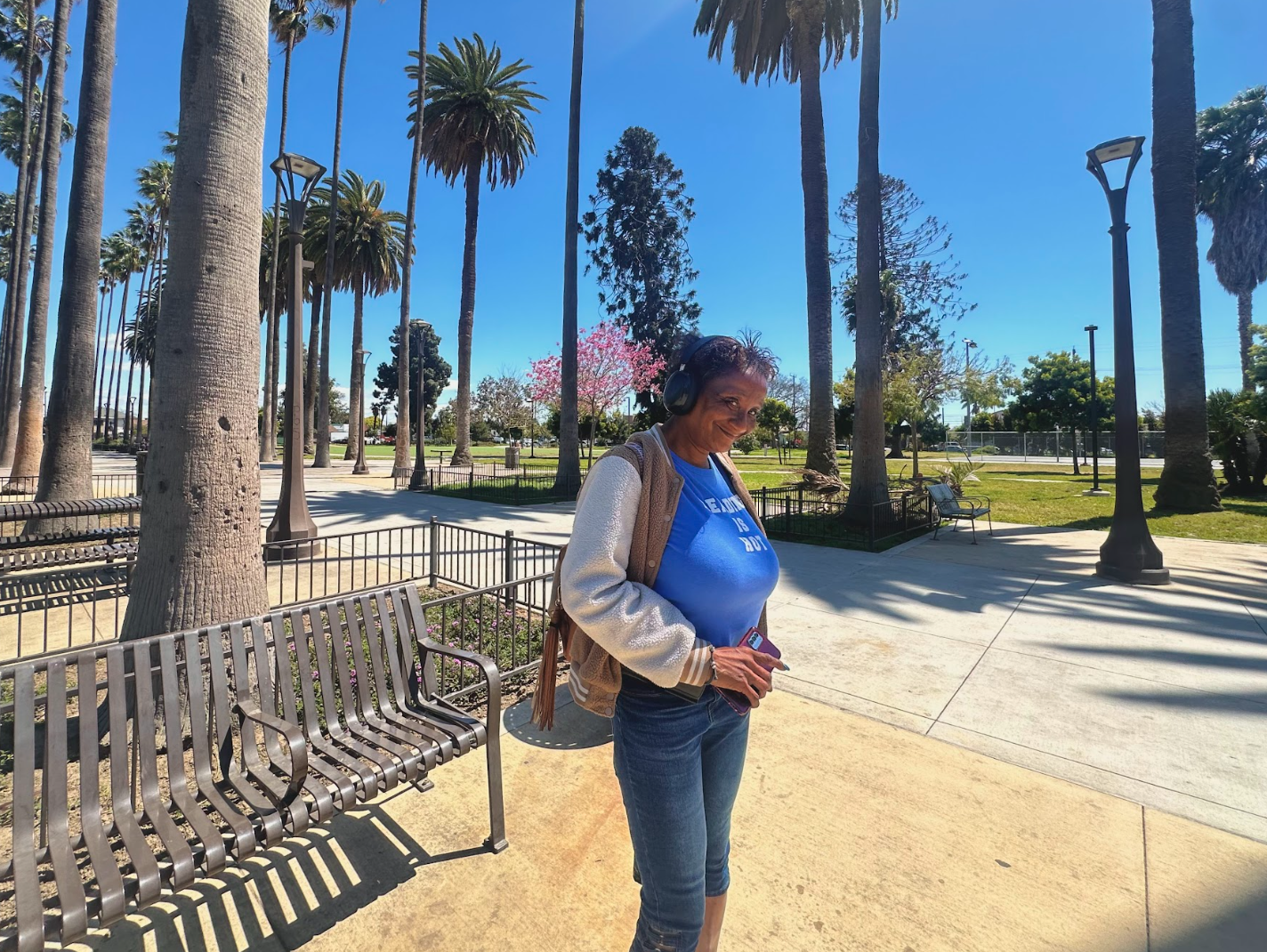
Amanda Walker at the park before meeting up with her friends. (Photo by Brenda Verano)
Walker said she loves coming to the park with her friends, who often use the park as a gathering place.
“I do wish there were more activities for adults,” she said. “The park has a playground for kids, and basketball courts… we need more things in the park for people like me.”
Maria L., 30, said she also comes to the park to be surrounded by nature. Although she lives in South Central, she said she does not have much free time to come as often as she would like.
“I haven’t been here in about eight months,” she said. Although she was alone, she was on a video call with her family where she was able to show them the scenery of the park and said she was surprised at how green and vibrant it all looked.
“I like coming here to just sit and hang out,” she said. She enjoys the sense of community she feels when being in the park. “Some people are walking their dogs; others are exercising or simply just laying down. It’s nice. I also like seeing the birds and the squirrels,” she said.
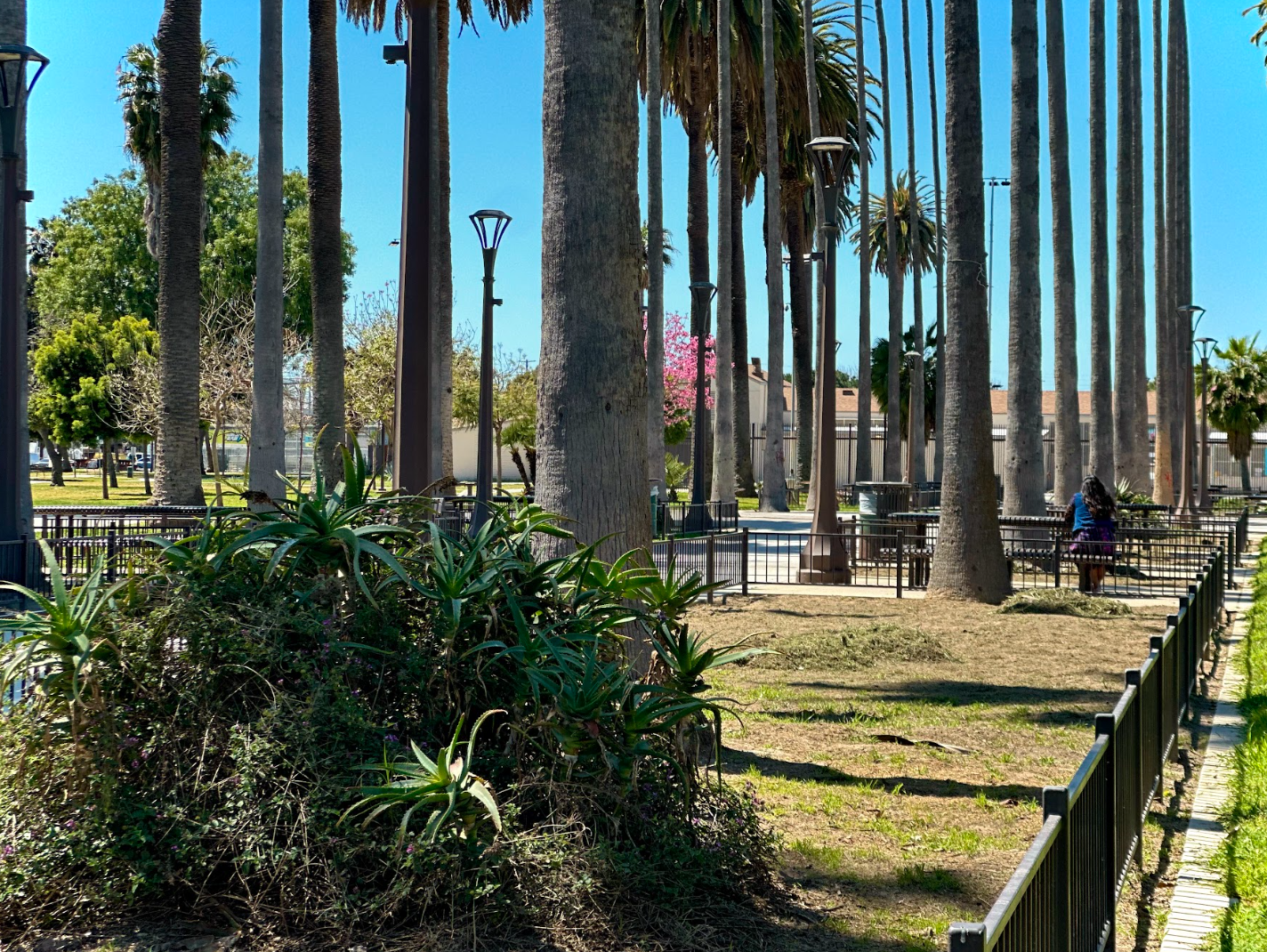
From a distance, Maria L. sits in the sun on the park benches. (Photo by Brenda Verano)
The relationship between access to parks and life expectancy are closely linked. Park deserts can have disastrous effects on residents as well as wildlife, as stated by a study conducted by the Prevention Institute in partnership with University of California, Los Angeles , the National Health Foundation, Community Coalition, Esperanza Community Housing Corporation and the Social Justice Learning Institute.
According to the research, South Central L.A. is considered to have “high park need” and “very high park need” neighborhoods, with an average of 1.6 and 0.7 acres of parkland per 1,000 residents, in comparison to the L.A. countywide average, which is 3.3 acres of parkland per 1,000 residents. The median life expectancy in South L.A. is 77 years, well below the level for the county as a whole. About 15 miles away, in the community of Beverly Hills, the life expectancy is about 90 years, 13 years higher.
South Central residents have been asking for more investment in parks and recreational facilities. In 2018, the 18.25-acre park went through a multi-million renovation, which allocated funding for the improvement of its gym, swimming pool, basketball and tennis courts, baseball diamond, outdoor stage, fitness area, picnic tables and children’s play area.
Despite the recent investments, the park has also been widely known for its gang and chrome activity, which the community says has been a direct effect of years of disinvestment and neglect.
In previous years, the Los Angeles Police Department identified the park as an area where gang activity—specifically from the Avalon Gangster Crips, Broadway Gangster Crips and 52nd Street Playboys—has been observed.
“The problem was scanned and revealed that this park, like many others in urban America, had slowly been neglected and overrun by criminal activity that revolved around gangs, narcotics and quality of life issues,” states the LAPD. “The analysis of the problem at the park was conducted by reviewing data, meeting with officers and receiving input from local community representatives and park staff members.”
Despite this, the community recognized the park as a long-standing historical entity of South Central L.A.
As one of the oldest parks in the city, South L.A. Park continues to be home to local residents, wildlife, street vendors, youth and all the great things that make up Los Angeles.
EDITORS NOTE: This article was published through the Bezos Fellowship grant provided by the Ethnic Media Services, which recently changed its name to American Community Media. The article was written by Brenda Fernanda Verano, an award-winning journalist who reports for CALÓ News, a local non-profit newsroom focusing on the Latin American community of Los Angeles.
Arts & Entertainment
LA Opera brings back Pride Night with a production of ‘Ainadamar’
Pride Night returns at the LA Opera

LA Opera is bringing back its Pride Night on Wednesday May 7, in partnership with the Opera League of Los Angeles.
LGBTQ members and allies will come together for Pride Night to indulge in a performance of “Ainadamar,” at the Dorothy Chandler Pavillion. The discounted tickets for Pride Night include access to a complimentary post-show party at Vespaio hosted by the Opera League of Los Angeles, featuring Cal-Italian bites from Chef Agostino Sciandri.
“Ainadamar” is a tribute to Spanish poet and queer icon, Federico García Lorca.
“This season, we celebrate with ‘Ainadamar,’ a powerful tribute to Spanish poet and queer icon Federico García Lorca. These pairings matter. They highlight that opera is a living, evolving art form—one that speaks to all people and reflects the diversity of the world we live in,” said Christopher Koelsch, president and CEO of LA Opera.
The central plot of “Ainadamar,” which is the Arabic meaning for ‘fountain of tears,’ follows Ana María Martínez as Margarita Xirgu, an actress who spent half of her career portraying Mariana Pineda, who was a 19th-century Spanish liberalist heroine, in Lorca’s play. Pineda was a political martyr who was executed for embroidering a flag with the slogan “Equality, Freedom and Law,” in protest of the absolutist Spanish regime.
The production, running at approximately one hour and 20 minutes, sets the stage with a throwback, recounting Lorca’s life and his last days in the Spanish Civil War.
“At the heart of our Pride Night celebration is the belief that everyone should feel seen onstage and off. Opera is a space for community and belonging, where our audiences can recognize themselves not only among fellow attendees, but also in our artists, our music and the stories we tell,” said Koelsch.
This major company premiere, led by resident conductor Lina Gonzáles-Granados, is sung in Spanish, with English and Spanish subtitles. Grammy-winning composer Osvaldo Golijov produces the dramatic, flamenco-inspired score that meets the poignant libretto by David Henry Hwang.
During the COVID-19 shutdowns, live performances at the LA Opera were put on hold and the journey to bring back Pride Night, among many other in-person performances, was a struggle filled with many moving parts.
“COVID-19 suspended live performances across the board and during our return season we were navigating the different timelines for audiences returning to live theater. It was very much a matter of listening to our community and learning what had changed for them as well as us: some opted for livestream options, others preferred only outdoor events, and so on,” said Koelsch. “Once we found our stride, we were excited to bring back Pride Night the following season during ‘The Marriage of Figaro.’”
This year the LA Opera is celebrating their 40th anniversary by launching their 40th Anniversary Campaign to raise resources needed to continue funding their organization.The show opens on Saturday, April 26 and runs through May 18. Purchase tickets by clicking here.
a&e features
Meet the chef who built his legacy in the LGBTQ+ community
He is an icon in the Hollywood culinary scene and a fierce ally in the LGBTQ community

Editor’s note: The interview with Chef Juan featured in this article was done in Spanish and translated accordingly for this article, but kept in its original format.
Juan Raigosa Chavez is the living embodiment of the American dream that many can only hope for. During his 40-year culinary journey, he was able to become a legal citizen and has enjoyed the privileges of living and working in Los Angeles for four decades.
Chef Juan migrated here from Zacatecas, Mexico in 1985 and since then he has worked his way up to his current position as one of West Hollywood’s most beloved chefs in the LGBTQ+ bar scene.
He started his journey as a dishwasher and through his hard work, dedication to achieving the American dream and meticulous work ethic, he was able to climb the ranks in the kitchen team hierarchy.
“Primero empecé lavando platos en 1985 en Marix Tex Mex [Café] en Hollywood. Y después me hice preparador, después me hice cocinero. Y luego me hicieron kitchen manager, primero de Marix y luego de Basix Café haciendo creatividad de menús, variedad de comida, y más,” nos dice Chef Juan. “Me mandaron a las mejores escuelas culinarias de San Francisco pagados por la dueña de Basix.”
“First, I started washing dishes in 1985 at Marix Tex Mex [Café] in Hollywood. Then, I was promoted to food prep, then kitchen cook. Finally, I became kitchen manager—first at Marix and then an Basix Café—creating menus and a variety of dishes,” said Chef Juan. “[The restaurant owners] sent me to the best culinary schools in San Francisco, all paid for by the owners.”
Chef Juan was living the American dream and had worked very hard to get to the position he was in when Covid-19 hit and many restaurants, including both Marix and Basix were forced to close. As of earlier this year, it seems like Marix Tex Mex Café is apparently set to re-open at the same location, while the location Basix was in, is still up for lease.
WeHo times first reported that workers have been adding finishing touches to the exterior of the building, but the significant delay in re-opening is due to extensive water damage that happened while the location was closed.
“Mucha gente lloró, porque teníamos más de cuarenta personas a mi cargo allí,” recalls Chef Juan.
“A lot of people cried because there were over forty people who worked under my leadership during that time,” said Chef Juan.
He was laid-off for two years and then when he stopped receiving federal assistance, he uploaded his resume online and the previous owners of GymBar WeHo, immediately called him up to hire him as their chef.
During his time at Marix and Basix, he says he gained a lot of valuable experience and gained a deep respect for the rich and diverse community of Hollywood.
Within three days of uploading his resume, he was hired.
“No duraron ni tres días cuando ya estaba contratado por que, como te dire–me hice un poco famoso,” Chef Juan tells the Los Angeles Blade. “Muchos de la ‘community’ me reconocen.”
“Not even three days passed until I was fully hired, because how do I say this? I guess I got a little bit famous,” Chef Juan tells the Los Angeles Blade. “A lot of people in the community recognize me.”
At that moment, a patron from the restaurant kindly interrupted the interview to say goodbye to Chef Juan and thank him for the food.
“Si ves, siempre me saludan porque me conocen y saben quién soy,” nos dice Chef Juan.
“See? People always say hello to me because they recognize me and know who I am,” Chef Juan tells us.
He also tells us that many people who know that he started working at GymBar have asked him to recreate some of his famous dishes from when he worked at Marix and Basix.
Chef Juan says his favorite part about working in a kitchen is his ability and freedom to create new dishes and elevate recipes that have always been staple dishes in his life and culture.
Due to his heartwarming attitude, friendly face and incomparable work ethic, he is now a sought-after chef and iconic member of the Hollywood community.
“Bastante gente me ha buscado desde que empecé aquí,” said Chef Juan.
“Plenty of people have looked for me here since I started,” said Chef Juan.
When asked how he wins over new customers, he said he likes to start off by asking customers what their favorite dishes are and then he builds on that until he’s able to find something that they are excited to try.
He spoke passionately about how much he loves to win over new customers and continue to impress his loyal customers. He says that to avoid mistakes, he likes to personally train each person who works under him, saying this is how he ensures the quality of the food is consistently to his standards.
“Es hacer las cosas con amor—porque cuando estás enojado no te va a salir bien—la comida te sale perfecta,” said Chef Juan.
“It’s about doing everything with love so it comes out perfect, because when you’re angry, nothing will taste right,” said Chef Juan.
It goes without saying that he is an icon and when we asked him how he felt about his entire career and legacy being built around the LGBTQ+ community of West Hollywood as a Latin American person, his answer was heartwarming.
“I love my people of West Hollywood, my neighborhood and for me it’s all normal,” said Chef Juan in both English and Spanish. “For many people, I understand it’s scary, but I understand [them] and I love my people no matter what they do.”
Chef Juan continues his legacy as he celebrates his 40th year, now working at WeHo’s GymBar, which is run by one of the Dodgers executive’s, along with his husband. As an avid Dodger fan, Chef Juan has also had the opportunity to participate in cooking demonstrations led by chefs at Dodger Stadium. GymBar WeHo is actually one of the only other locations in LA—other than Dodger Stadium that sells the authentic Dodger Dog.
Now that baseball season is underway, Chef Juan invites everyone in the nearby communities to join them for a game and a Dodger Dog.
Local
New chapter: P3 Theatre Company moves to Los Angeles
P3 Theatre Company, a long-standing staple in Long Beach’s theatre scene, has officially relocated to Los Angeles.

P3 Theatre Company, a long-standing staple in Long Beach’s theatre scene, has officially relocated to Los Angeles. While the company remains close to its Long Beach roots, this move signals a fresh chapter and opportunity to connect to a broader audience.
Jon Peterson, Executive Director and Founder of P3 Theatre Company, discusses the transition.
“After the pandemic lifted, the venue we were renting in Long Beach was no longer available to us,” explained Peterson. “After some time, we decided to look in the Greater Los Angeles area. There are so many great venues available, and there’s definitely a huge demand for the arts.”
P3 Theatre’s first major production in Los Angeles will be “Day After Day” (The Life and Music of Doris Day), a sentimental and nostalgic celebration of the legendary singer and actress. The choice to revive this show was intentional — it was P3’s last production before the Covid-19 shutdown.
“‘Day After Day ‘ was a very successful production,” said Peterson, noting that it earned Deborah Robin the Best Performer in a Musical title at the Orange County Theatre Guild Awards. “It’s such an endearing show with tons of recognizable music and the dynamic story of Doris Day.”
While dazzling performances are integral to P3’s mission, the company is equally committed to community outreach. Peterson emphasized that the move to the West Hollywood and Hollywood areas, offer opportunities to collaborate with other nonprofits and expand access to the arts for marginalized groups.
“There is a huge demand for the arts in this region,” said Peterson. “We look forward to bringing shows that audiences are excited to see, as well as introducing new works that will enhance their theatrical experience.”
One of P3’s signature initiatives is P3 Educates+, a program designed to provide performing arts workshops to underserved communities. Catering to all ages – which Peterson describes as 0-100+ – the workshops include improvisation, acting, and singing.
“It provides more than just an education of theatre,” Peterson explained. “[It provides] a level of entertainment that marginalized communities may not have an opportunity to experience otherwise.”
Supporting LGBTQ+ stories and artists is also a core priority for P3 Theatre Company. Peterson highlighted the company’s commitment to producing both new LGBTQ+ works and celebrated classics.
“Our stories need to be told and heard,” Peterson emphasized. “What better way to do so than through the arts?”
Among P3’s proudest achievements are the world premieres of two acclaimed works by playwright Jiggs Burgess. The Red Suitcase won the prestigious Del Shores Playwright Competition, while Wounded earned multiple awards at the Hollywood Fringe Festival in 2023. The latter’s success secured an off-Broadway run at Soho Playhouse in New York City, with performances continuing in 2024 and 2025.
P3 Theatre Company has ambitious long-term goals for its future in Los Angeles. Peterson hopes to build a strong audience and donor base while eventually securing a permanent performance space.
“P3 Theatre Company’s long term goal is to grow a solid audience and donor base in Los Angeles – and to find ‘the perfect theatre’ to hang our hat in.” Peterson said. “It is our plan to call Los Angeles our home and to continue to produce professional theatre in a community where theatre is thriving.”
For those eager to experience P3’s return to the stage, tickets for Day After Day (The Life and Music of Doris Day) are now available. As Peterson says with confidence, “We know the audiences will love it!”
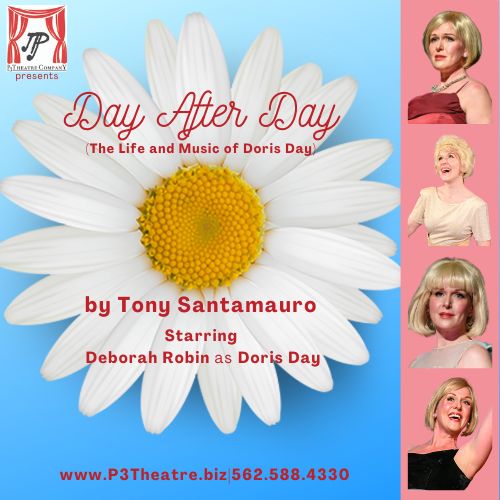
For more information about P3, head to www.p3theatre.biz
Events
Q Con 2025 taking place in West Hollywood, offering free admission
Reserve your free tickets at the Q Con website!

Q Con, SoCal’s only LGBTQ+ comic convention, is set to return Saturday, May 3, bringing in dozens of LGBTQ+ speakers, vendors, artists and community voices to their lineup.
“LGBTQIA+ people of all ages and backgrounds need to see themselves and their stories represented in the arts – to know they are okay, they are accepted and they are powerful. Q Con gives us the opportunity to do this – to raise queer voices in comic books and graphic novels, bring the community together and have a lot of fun at the same time,” said Ted Abenheim, president of Prism Comics.
Mark your calendars and start scheming up your queer cosplay outfits for a costume contest that celebrates the LGBTQ+ representation and visibility in one of the most queer-coded industries in media ahead of Pride month.
Prism Comics, the nonprofit organization championing LGBTQ+ representation and diversity in comic books, graphic novels and pop media, announced their 4th annual Q Con, happening in West Hollywood’s Plummer Park. The convention will take place in West Hollywood from 11AM to 6PM at Fiesta Hall.
The nonprofit established in 2003, is deemed the “LGBTQ+ Comics Central,” at San Diego Comic Con, WonderCon Anaheim, Los Angeles Comic Con and other conventions. Prism prides itself on providing a safe space for the LGBTQ+ community to unite over mutual passion, interest and love for comics, novels and more. This is the space where comic creators, readers, librarians, educators and families can come together and celebrate, discuss and enjoy the representation the community needs and deserves.
Find free tickets and more information regarding guest speakers, panels and vendors here.
Q Con is also currently seeking LGBTQ+ comic creators and businesses who are interested in setting up a table at the event. If interested in tabling or volunteering, email Ted Abenheim, President of Prism Comics at [email protected].
California
Running, racing, dodging: Janelle Kellman on her bid to be California’s next Lieutenant Governor
Kellman says that she wants to use the position to tie together responsible growth and addressing the affordability crisis

Janelle Kellman is used to running marathons, which comes in handy as she campaigns to be
California’s next Lieutenant Governor – a campaign she began in 2023 for an election
that won’t happen until November 2026.
“The secret to being a true runner is consistency and discipline,” she says. “Nobody will
outwork me. I am not career politician. I am somebody who is gonna roll up my sleeves
and do all of the hard work.”
If she wins, the environmental lawyer and former mayor of Sausalito will make history
as the highest-ranking LGBTQ person elected to statewide office in California. But Kellman says she’s no climber. She’s putting a large stock of her campaign on the fact that she’s not a Sacramento insider and she’s not planning to use the job as a springboard to some other, more high-profile job.
“Many people run for this position because they want to be something else. I’m not
trying to be something else. Actually, I really want to do this job,” Kellman says.
The Lieutenant Governor sits on the boards of all of California’s higher education
institutions and has a significant role in natural resources and economic planning
through membership on the State Lands Commission, Coastal Commission, and
Commission for Economic Development.
Kellman says that she wants to use the position to tie together responsible growth and
addressing the affordability crisis that has seen hundreds of thousands of people leave
the state.
“There’s three things we really need to be focusing on to address affordability crisis.
Number one more housing of all types. Number two, proper public safety policies and
keeping our families safe. And number three, better mental health programs, both to keep people off the streets and address the homelessness problem and to support our
children,” she says.
Meeting these challenges will require someone who can ensure that many different
parts of California’s government – from the education system, the housing approvals
process, to the legal system, the heath care system and more – are laser focused on
bringing down the cost of living, Kellman says.
“I’m a lifelong team sport athlete and I’ve always been the captain of all the sports, and I
see [being Lieutenant-Governor] very much as a unifying collaboration type role, right?
This is a role I specifically want because I like that dynamic. I am really drawn to the opportunity to bring experts together.”
Kellman is aware of the symbolism her serving as Lieutenant Governor as a queer
woman would have in 2025.
“Our rights are under attack nationwide, and I see it as more important than ever that
California continue to be a stronghold of equity and inclusion,” she says. “To have
somebody who represents a minority community at the helm of our government really
gives visibility to our issues and reinforces that Californian is a place that values equality
and inclusion.”
Still, on one of the thornier issues of queer inclusion, Kellman is noticeably aversive.
She was quick to scold the Gov. Gavin Newsom when asked to comment on his recent podcast where he mused that trans women competing in women’s sports was “deeply unfair.”
“I hope that he would aim to represent all members of the State of California. So, I
hope he continues to govern and not just have a podcast for the next couple of years,”
she says. “But it’s also an opportunity to remind voters and remind everybody, it’s much more than that. It’s about inclusion. It’s about education. It’s about mental health and wellness.
There are so many issues that affect people Nationwide and Statewide. We’ve got to
stay focused on the big picture.”
But does that mean that she would advocate for trans women athletes being able to
compete in women’s sports, particularly as the lieutenant governor has a role in higher
education, where this issue has been in focus?
“I think the role of the Lieutenant Governor as an individual who sits on many of these
boards is to ensure that all students are treated fairly, and all our young people feel safe,
whoever they are on college campuses. I think that is the number one. No matter your background, no matter your orientation. So I would apply that across the board to anybody on college campuses,” she says.
Given one more chance to clarify her position, Kellman dodges again.
“I think that we have bigger issues to be talking about in the United States and
California,” she says.
But Kellman is critical of the Democratic political establishment that has entrenched
itself in Sacramento, which she characterizes as impeding progress on California’s most
critical issues.
“We’ve become an obstructionist party, and we need to be a party that gets things
done,” she says. “I’ve been able to get a lot done even as a small town mayor, and I see
my fellow mayors be able to get things done at the local level, I want to raise that up so
that it happens statewide.
“Let’s be the party that gets things done. And let’s focus on this high cost of living first
and foremost,” she says.
Without invoking the specter of the word “efficiency” in today’s political climate, Kellman
is also eager to hold the establishment to account for solving the state’s problems.
“Where’s the accountability? Where’s the transparency? What is happening in real
time? Let’s take homelessness, right? We know that as a state from 2017-18 to now, we
spent 22 billion dollars on homelessness. And during that same time period, the number
of unhoused in California went up by a third. Now, what if we were actually demanding
accountability and transparency along the way?”
And she’s eager to hold herself to account in office, too.
“If this was the private sector, I’d get hired. Because we would say you know how to do
the job, you’re going to be held accountable. We need more of that.”
California
Two anti-trans bills fail to advance in California
AB 89 and AB 844 were aimed at banning trans women and girls from competing in women’s sports
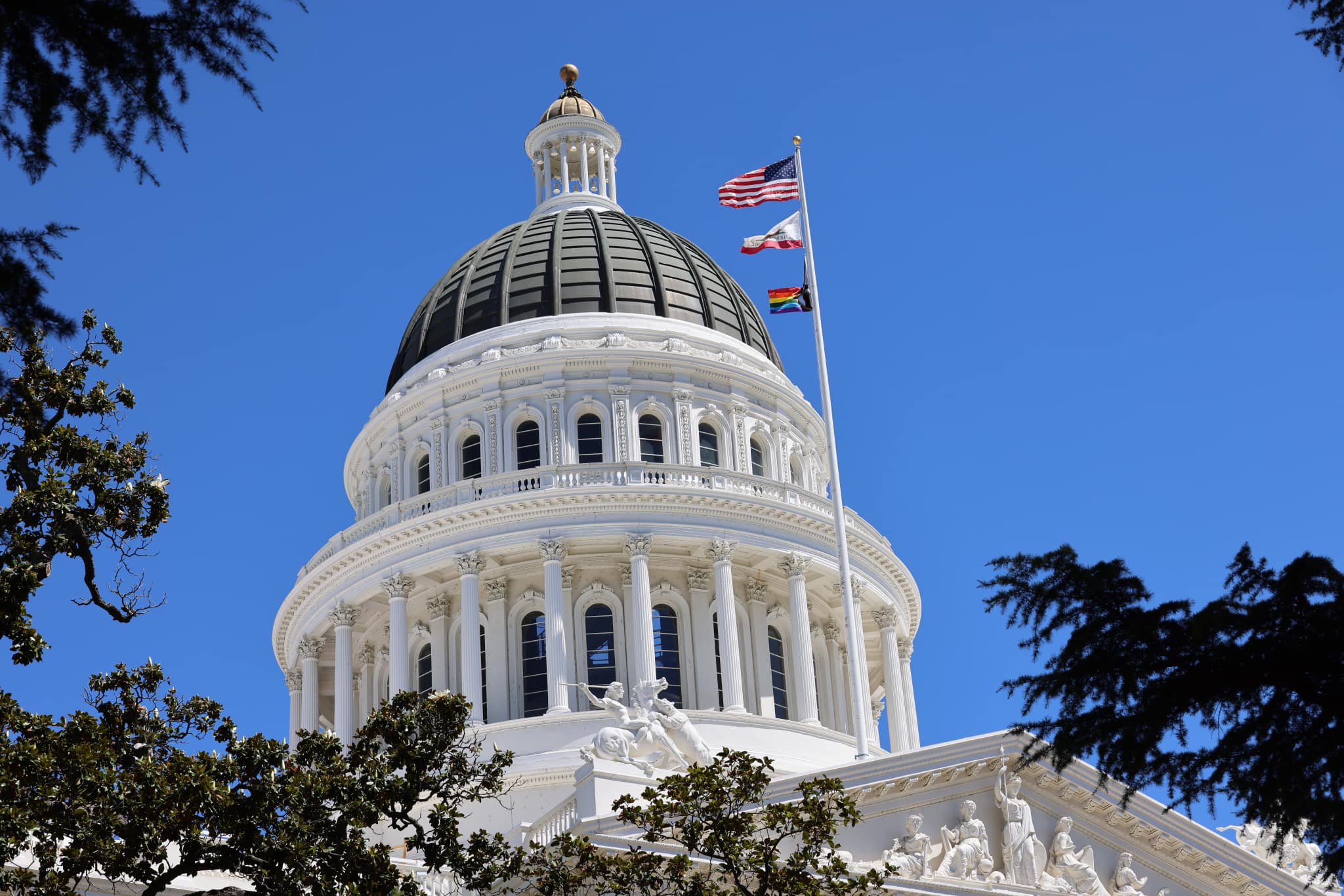
The two bills introduced by Republican lawmakers aimed at banning trans athletes from female sports, did not pass during yesterday’s committee meeting.
Assembly Bill 89 and Assembly Bill 844, have failed to advance in the Arts, Entertainment, Sports and Tourism Committee on Tuesday by a 2-6 vote on each bill. AB 89, introduced by Assemblymember Kate Sanchez (R-Rancho Santa Margarita) and AB 844, introduced by Assemblymember Bill Essayli (R-Riverside), were both rejected by California lawmakers.
“If these members and their counterparts were truly committed to addressing the inequities and safety concerns women and girls face—in sports and everyday life—they would be joining the frontlines in the fight for equal pay, stronger protections against domestic violence and sexual assault, and expanded healthcare resources,” said Tony Hoang, executive director at Equality California.
AB 89 and AB 844 are part of the nationwide coordinated effort led by extremists in Washington D.C. to sow fear and misinformation about transgender people—in particular youth—and attempt to erase them from virtually all areas of public life.
“Instead of tackling the real problems in our state like high inflation and rising healthcare costs, Assemblymembers Sanchez and Essayli continue to waste time and taxpayer money using transgender youth as political pawns in a shameful display of divisive politics and a thirst for attention.,” said Hoang.
AB 89 would have established a ban on athletes whose sex was assigned male at birth, from competing on a girls’ interscholastic sports team.
AB 844 would have reversed California’s law which currently allows trans athletes to participate in girls and women’s sports teams across all age levels, up to college level.
Tuesday’s hearing marked the first public debate on the issue in California since Newsom’s public comments about trans women in sports being “deeply unfair.”
On Friday, Gov. Newsom’s office confirmed it received a letter from U.S. Education Secretary Linda McMahon, stating that California could lose federal funds if it continued to allow trans athletes to compete in women’s and girls’ sports.
“As Secretary of Education, I am officially asking you to inform this Department whether you will remind schools in California to comply with federal law by protecting sex-separated spaces and activities. I am also officially asking you to publicly assure parents that California teachers will not facilitate the fantasy of ‘gender transitions’ for their children,” she wrote in the letter.
Equality California continues their partnership with the Legislative LGBTQ+ Caucus and other legislative partners in an effort to combat the passage of bills like AB 89 and AB 844.
“We are pleased these bills have failed and are thankful to those lawmakers who opposed this dangerous legislation in committee, particularly to the committee chair, Assemblymember Chris Ward, for his leadership,” said Hoang.
California
GLAAD’s Latine Honors celebrates culture and identity with packed house

GLAAD’s Spanish-Language & Latine Media created and produced the first Latine Honors, nearly blowing the roof off of Grandmaster Recorders in Hollywood, with a more-than-packed house full of stars.
The Latine Honors were created to celebrate the best in queer, Latine visibility and representation in entertainment media, advocacy and journalism. This event happened back-to-back-to-back with the GLAAD Black and Brown Honors and the 36th GLAAD Media Awards.
The Latine Honors were hosted by the hilarious stand-up comedian Roz Hernandez, who continues to make waves in the Los Angeles comedy scene and beyond.
“Every single time [GLAAD] calls, I answer,” said Hernandez on the carpet.
Hernandez says she is very lucky to be acknowledged by GLAAD and to join forces with them in the work they do for the LGBTQ+ community.
The Spanish-Language Special Recognition Awards were presented on stage by Harvey Guillén to “The Q Agenda,” a TV series on Latin Nation and “La Verdrag,” a news show on Canal Once, for their incomparable contributions to queer, Latine representation in media.
LA Blade had the chance to interview some of the Latine stars that graced the carpet to offer their two cents on issues affecting the LGBTQ+ community, including Harvey Guillén, Vico Ortíz, David Archuleta and members of “The Q Agenda.”
“I think now more than ever, it’s important for us to remember that we can’t be numb to the things happening around us,” said Guillén. “People are becoming less empathetic toward our community and other communities being attacked, so we have to remember to not lose focus. Do not lose focus and do not lose empathy.”
We also had a chance to catch up with Ortíz on the carpet. They are currently hosting a daily LGBTQ+ news podcast with Nay Bever, where together, they tactfully deliver the news that is relevant to our communities.
“I am co-hosting a daily news podcast called ‘Today in Gay,’ where we wake up everyday, we read the news and then report them to our queer community,” said Ortíz. “It’s quite a responsibility, but I’m also really honored to deliver [the news] with care and tenderness and tact.”
Ortíz was an honoree at the Latine Honors for their outstanding contributions to the media and entertainment industries as a Puerto Rican, non-binary, multi-hyphenated artist.
Archuleta spoke to us about his latest single Créme Bruleé, which incorporates a Latin flare to a pop tune.
“I’m so excited because I just released a new song, Creme Bruleé” said Archuleta. “I was really inspired by the pop girlies – Chapelle, Sabrina, Charlie [XCX], Billie [Eilish], and I just thought I wanted to channel that and I want to feel that confidence and that sexiness that I feel when I listen to their music, but I wanted to add a Latin flare to it.”
Keynote remarks were delivered by GLAAD President and CEO, Sarah Kate Ellis; welcome remarks were shared by Monica Tresandes, Senior Director of Spanish Language & Latine Media and Representation; and Gabe Gonzalez, host of GLAAD’s original ¡DÍMELO!, shared remarks about the attendees representing the Latine creators and media from across the industry.
Arts & Entertainment
2025 Best of LGBTQ LA Readers’ Choice Award Nominations
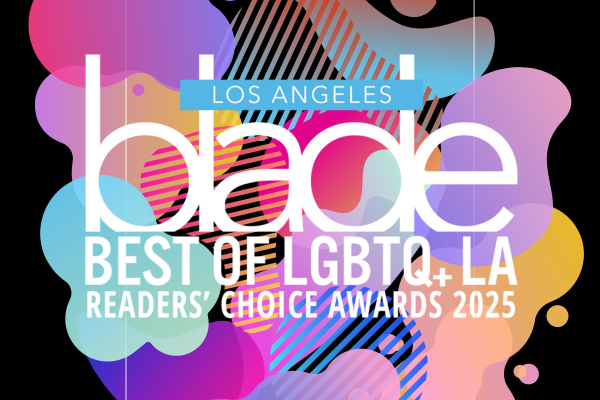
It’s time to celebrate the vibrant and diverse LGBTQ+ community of Los Angeles! Nominations for the Best of LGBTQ LA Awards are open from March 31st to April 6th, giving you the chance to highlight your favorite local legends, hotspots, performers, and change-makers. Then, from April 14th to April 27th, cast your vote for the finalists and help decide who truly represents the best of LGBTQ LA.
Use the form below or click the link HERE to nominate!
Local
‘Think of those who have not been seen,’ Cynthia Erivo’s powerful message at GLAAD Awards
Erivo and Doechii delivered powerful acceptance speeches at the 36th GLAAD Media Awards

GLAAD celebrated its 40th anniversary with a star-studded gala in Beverly Hills, honoring achievements in LGBTQ+ media and entertainment, while pushing back at efforts nationwide to turn back civil rights protections, restrict and erase transgender identities.
Doechii accepted a GLAAD Media Award for outstanding music artist, Harper Steele won for outstanding documentary for Will & Harper and Nava Mau was honored with the outstanding series – limited anthology award for Baby Reindeer.
Those in attendance rose for a long and enthusiastic standing ovation as the prestigious Stephen F. Kolzak Award was presented to Cynthia Erivo.
“It isn’t easy. None of it is, waking up and choosing to be yourself, proclaiming a space belongs to you when you don’t feel welcomed,” said Erivo.
The 38-year-old queer Oscar nominee and Emmy, Tony and Grammy winner delivered a moving acceptance speech, in which she thanked GLAAD but also called on the audience to do more to help those in the community who have not yet come out. Video of her remarks has gone viral on Instagram.
“Here in this room, we have all been the recipients of the gift that is the opportunity to be more. I doubt that it has come easy to any of us, but more, for some, the road has not been one paved with yellow bricks, but instead paved with bumps and potholes. Whichever road you have traveled, how beautiful it is that you’ve had a road to travel on at all. There are the invisible ones who have had no road at all. For those who have not
yet even begun to find the road, be encouraged and be patient with yourself, it will show itself,” Erivo said. Then she paused from reading the speech that was in the teleprompter, and ad libbed a poetic, closing message.
“We use the phrase ‘out and proud,’ and though you might not have the strength or capacity to do that now, know that I am proud of your quiet and solitary want to be just that,” she said, and then addressed the community ahead of Transgender Day of Visibility. “We are all visible. We can be seen. We see each other. I see you, you see me. But think of those who have not been seen, think of those who sit in the dark and wait their turn, hoping and waiting for a light to light their path. I ask every single one of you in this room, with the spaces that you’re in, and the lights that you hold, to point it in the direction of someone who just needs a little guidance.”
Broadway legend Patti LuPone offered guidance from queer icons, past and present, when she took the stage to recite inspiring quotes that brought the house down.
“I can no longer accept the things I cannot change. I am changing the things I cannot accept,” LuPone quoted lesbian, feminist, activist Angela Davis. “Coming out is the most political thing you can do,” she said, quoting Harvey Milk.
Then LuPone cited some of the stars of Drag Race, including Valentina, Kennedy Davenport, Alyssa Edwards, Trixie Mattel, Plane Jane, and Latrice Royale. But it was the words of OG Drag Race alumna Bianca Del Rio that got the crowd on its feet: “Not today, Satan. Not today!”
“Right now, LGBTQ+ rights are under attack, but what they take from us, they take from you too,” said Brian Michael Smith, upon winning the award for outstanding drama series for 911: Lone Star. “These aren’t isolated rollbacks; they’re attacks on all of our civil rights. This kind of representation is more than visibility, it’s resistance.”
When Doechii accepted the trophy for outstanding music artist at the ceremony, the “Denial Is a River” rapper commented on this politically charged moment for the LGBTQ community, as she praised GLAAD for its principles of “acceptance, inclusiveness and empowerment.”
“Those are the same things I strongly believe in and advocate for and that continue to propel me forward, especially now that hard-won cultural change and rights for transgender people and the LGBTQ community have been threatened,” said Doechii. “And I am disgusted. Disgusted. But I want to say that we are here and we are not going anywhere.”
“These kinds of events help me to feel support, to feel like we’re a team working together to make ourselves feel more seen, make others feel more seen, and there’s so much still to celebrate,” said singer songwriter David Archuleta, the American Idol alum who made headlines in 2021 when he came out and quit the Mormon Church. On the red carpet before the gala, he shared with the Los Angeles Blade his advice to fans who want to find joy amid the gloom: “I love to go dance. Dance is so therapeutic. It’s a place where you can just shake it off, feel hot, go out, and that’s a therapeutic way.”
“This is where I find joy,” Michaela Jaé Rodriguez told the Blade. “But the best times where I find even more joy is learning what state we’re in. Learning how I can fire myself, put a fire behind me, and stay as vigilant as possible and be in the forefront and never disappear. And I want to encourage that to a lot of my young individuals out there. Don’t disappear. Stand out, be proud, and don’t be scared. I’m not scared!”
“It feels amazing, being surrounded by basically my own people is always like a big warm hug, so I love it,” Harper Steele told the Blade.
The writer, who took home a GLAAD trophy for her award-winning documentary with her friend and fellow SNL alum Will Ferrell, noted that despite the joy of the evening, she was “very sad” about political moves targeting the transgender community in Washington, D.C. as well where she grew up in Iowa.
“My own home state, who gave me trans protections and rights, just took them away,” Steele told the Blade. “We’re the first group that’s ever had those rights taken away from us, so we’re in a weird time. I’m going to keep doing the best I can to convince people that they’re wrong. Not only are they wrong, but they’re being stupid.”
The Washington Blade was nominated for its coverage of the 2024 Summer Olympics Games, ”Paris Olympics: More queer athletes, more medals, more Pride, less Grindr,” in the category of outstanding print article. The winner was “‘Changing The Narrative’: Advocates Fight HIV Stigma in Dallas’ Latino Community” by Abraham Nudelstejer of The Dallas Morning News. The Advocate won for outstanding magazine overall coverage, and Jo Yurcaba of NBC Out won for “Friends Remember Nex Benedict, Oklahoma Student Who Died After School Fight, as ‘Fiery Kid.’”
The Blade also spoke to GLAAD President and CEO Sarah Kate Ellis on the red carpet.
Ellis and the organization survived a difficult challenge in 2024 when Ellis herself came under fire from The New York Times for what it called “lavish” spending. It should be noted that in a one-on-one conversation with Variety in October, Ellis pointed out that The Times report omitted mention of GLAAD’s multi-year campaign that called attention to the newspaper’s unbalanced coverage of issues related to transgender Americans and gender-affirming care, and that any spending issues raised by the report — seen by many as a hit piece in retaliation for GLAAD’s campaign — had already been addressed “two years ago.”
Ellis told the Blade she remains focused on GLAAD’s mission to advance acceptance of the LGBTQ community in media.
“I think tonight for me is about getting everybody together to talk about our stories, how important they are, and make sure that we are plastering the airwaves with our stories. And I think it’s about moving forward and having a plan. We have a plan at GLAAD. We understand what’s happened to this media ecosystem and we’re forging forward.”
Ellis spoke passionately about the challenge the nonprofit faces in 2025 and beyond.
“I think the media ecosystem has changed so dramatically and tectonically in a short period of time, “ she said. “We’re seeing that right-wing media gets about 100 million people a week. Progressive media reaches 30 million people a week. So, we have a 70 million person gap, and that gap is why we’re losing presidential campaigns, why we’re losing the narrative, why our community is under siege. We have to close that gap.”
Read the full list of nominees and winners of this year’s GLAAD Media Awards here.
-

 a&e features3 days ago
a&e features3 days agoMusical Mondays, a mainstay in WeHo nightlife, celebrates 16 years
-

 National2 days ago
National2 days agoDiscredited former cop played ‘key role’ in deportation of gay make-up artist
-

 Arts & Entertainment3 days ago
Arts & Entertainment3 days ago‘Bring it to Brunch’ returns to West Hollywood
-

 Myanmar3 days ago
Myanmar3 days agoLGBTQ+ advocacy group joins Myanmar earthquake relief effort
-

 California2 days ago
California2 days agoSouth Park provides green space to a predominantly Latino community
-

 a&e features3 days ago
a&e features3 days agoPeppermint thrives in the spotlight
-

 Arts & Entertainment20 hours ago
Arts & Entertainment20 hours agoSouth Coast Repertory Theatre hosting world premiere production
-

 Arts & Entertainment15 hours ago
Arts & Entertainment15 hours agoA Night of Legacy, Love, and Liberation: Inside the 2025 April Fool’s Ball
-

 Movies5 hours ago
Movies5 hours agoHeartfelt ‘Wedding Banquet’ remake a romcom worth seeing



